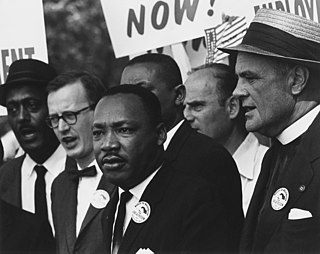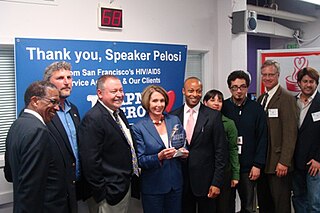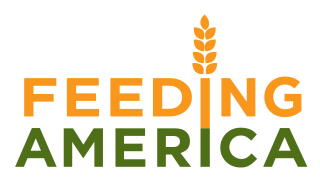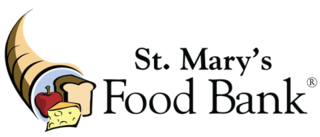
In politics, humanitarian aid, and the social sciences, hunger is defined as a condition in which a person does not have the physical or financial capability to eat sufficient food to meet basic nutritional needs for a sustained period. In the field of hunger relief, the term hunger is used in a sense that goes beyond the common desire for food that all humans experience, also known as an appetite. The most extreme form of hunger, when malnutrition is widespread, and when people have started dying of starvation through lack of access to sufficient, nutritious food, leads to a declaration of famine.

Food Not Bombs (FNB) is a loose-knit group of independent collectives, sharing free, usually vegan and vegetarian food with others. The group believes that corporate and government priorities are skewed to allow hunger to persist in the midst of abundance. To demonstrate this, FNB serves surplus food gathered from grocery stores, bakeries and markets which would otherwise go to waste, or occasionally has already been thrown away. The group exhibits a form of franchise activism.

A soup kitchen, food kitchen, or meal center is a place where food is offered to the hungry usually for no price, or sometimes at a below-market price. Frequently located in lower-income neighborhoods, soup kitchens are often staffed by volunteer organizations, such as church or community groups. Soup kitchens sometimes obtain food from a food bank for free or at a low price, because they are considered a charity, which makes it easier for them to feed the many people who require their services.

The Mid Day Meal Scheme is a school meal programme in India designed to better the nutritional status of school-age children nationwide. The scheme has been renamed as PM-POSHAN Scheme. The programme supplies free lunches on working days for children in government primary and upper primary schools, government aided Anganwadis, Madarsa and Maqtabs. Serving 120 million children in over 1.27 million schools and Education Guarantee Scheme centres, the Midday Meal Scheme is the largest of its kind in the world.

Project Open Hand is a California nonprofit organization that provides medically tailored meals and groceries to elderly and homebound people in San Francisco and Alameda County. Founded in 1985 to deliver meals to people with AIDS, it also took over food banks in the 1980s and 1990s and in the 21st century extended its services to include people with other acute and chronic conditions and to serve lunches to seniors. Its headquarters are at 730 Polk Street in the Tenderloin; its CEO is Paul Hepfer.

A food bank is a non-profit, charitable organization that distributes food to those who have difficulty purchasing enough to avoid hunger, usually through intermediaries like food pantries and soup kitchens. Some food banks distribute food directly with their food pantries.

Feeding America is a United States–based non-profit organization that is a nationwide network of more than 200 food banks that feed more than 46 million people through food pantries, soup kitchens, shelters, and other community-based agencies. Forbes ranks it as the largest U.S. charity by revenue. Feeding America was known as America's Second Harvest until August 31, 2008.

Sprouts Farmers Market, Inc., is a supermarket chain headquartered in Phoenix, Arizona. The grocer offers a wide selection of natural and organic foods, including fresh produce, bulk foods, vitamins and supplements, packaged groceries, meat, poultry, seafood, deli, baked goods, dairy products, frozen foods, natural body care, and household items. Sprouts employs 35,000 workers and operates more than 400 stores in 23 states.

Food rescue, also called food recovery, food salvage or surplus food redistribution, is the practice of gleaning edible food that would otherwise go to waste from places such as farms, produce markets, grocery stores, restaurants, or dining facilities and distributing it to local emergency food programs.

Redwood Empire Food Bank (REFB) is a food bank on the North Coast of California which belongs to the Feeding America network. Its mission is to end hunger in its community.
Hunger Task Force, Inc. is a non-profit, anti-hunger public policy organization in Milwaukee, Wisconsin. Hunger Task Force works to end hunger in Milwaukee County, Wisconsin by providing direct food delivery services, and works to end future hunger by advocating for fair and responsible administration of federal nutrition assistance programs.
Chronic hunger has affected a sizable proportion of the UK's population throughout its history. Following improved economic conditions that followed World War II, hunger became a less pressing issue. Yet since the lasting global inflation in the price of food that began in late 2006 and especially since the financial crisis of 2009, long term hunger began to return as a prominent social problem. Albeit only affecting a small minority of the UK's population, by December 2013, according to a group of doctors and academics writing in the British Medical Journal, hunger in the UK had reached the level of a "public health emergency".
The Silicon Valley Community Foundation (SVCF) is a donor-advised community foundation serving the Silicon Valley region. It is the largest charitable foundation in Silicon Valley.
Food Lifeline is a non-profit organization that supplies food to different food banks across Western Washington. Food Lifeline is responsible for repackaging and delivering food to 275 different organizations that distribute meals to the Western Washington population. Out of all the food distributed to these different organizations, 30% of the meals end up coming directly from Food Lifeline alone. Food Lifeline is part of a nationwide non-profit called Feeding America and assists in collecting food that would otherwise go to waste.

A community fridge is a refrigerator located in a public space. Sometimes called freedges, they are a type of mutual aid project that enables food to be shared within a community. Some community fridges also have an associated area for non-perishable food. Unlike traditional food pantries, these grassroots projects encourage anyone to put food in and take food out without limit, helping to remove the stigma from its use. The fridges take a decentralized approach, often being maintained by a network of volunteers, community members, local businesses, and larger organizations. Food in community fridges is primarily donated by individuals or food rescue organizations and can be sourced from a variety of places. Major grocers like Trader Joe's and Whole Foods donate large amounts of excess foods to food rescue organizations that then donate to these fridges. The food donated would have otherwise been thrown out.
Felix Project is a United Kingdom charitable organization that saves surplus food from suppliers and redistributes it to charities. It has the dual aim to help reduce food surplus. The Waste & Resources Action Programme estimate that 10 million tonnes of food was thrown away in the UK in 2016 and help relieve food poverty
City Harvest London is a charitable organisation focused on alleviating food insecurity and food waste across London. City Harvest feeds over 12,000 Londoners a day with quality, nutritious, surplus food from a myriad of food producers. City Harvest delivers food to over 350 organisations and projects in London that serve almost every vulnerable group in the capital including but not limited to; children, refugees, families, women facing domestic violence, the homeless. Food often acts as a tool that breaks down barriers between organisations and their users and becomes a gateway to services which address other societal issues.

No Food Waste (NFW) is a movement turned NGO started by Padmanaban Gopalan and his friends Dinesh manickam and Sudhakar Mohan to get rid of the problem of hunger. The team of No Food Waste scouts for marriage halls, institutions and homes that might have excess food. The food is collected and then repackaged and distributed to the people in need. On an average, 600 plates of food were being provided daily as reported in 2017.

St. Mary's Food Bank Alliance is a nonprofit, nonsectarian organization located in Phoenix, Arizona. Founded in 1967 by John van Hengel, St. Mary's was the first modern organization to operate using the food bank model, which spread throughout U.S. and the rest of the world. Today, St. Mary's is recognized as the world's first food bank.

Second Harvest of Silicon Valley is a food bank based in San Jose, California, that serves Santa Clara and San Mateo counties, including Silicon Valley and the San Francisco Peninsula. With $136 million in revenue in 2019, it is the largest food bank in the San Francisco Bay Area and the 12th largest in the United States. As of 2020, it serves about 500,000 people on average per month. It is affiliated with Feeding America, a national network of food banks, as well as the California Association of Food Banks. Leslie Bacho is the organization's chief executive officer.












